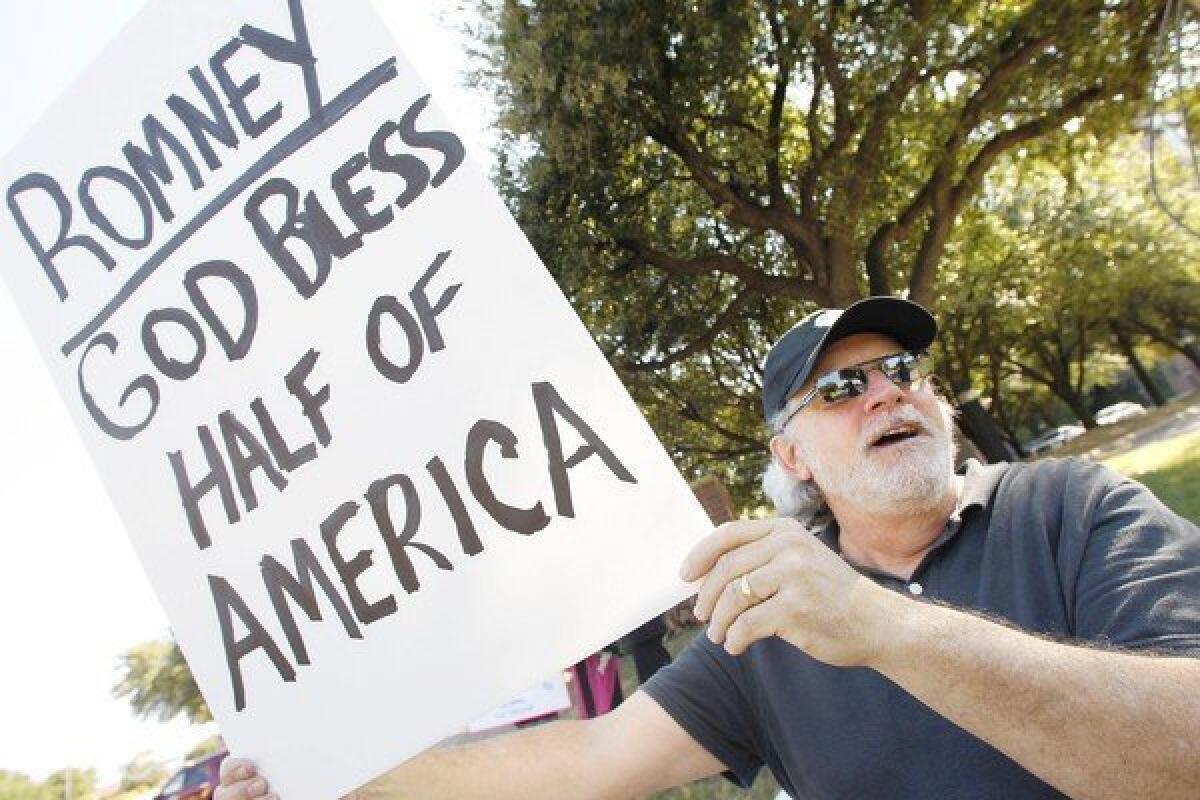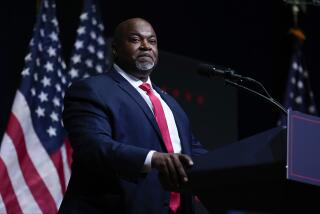Romney’s ‘victims’ comment may cost him precious time

- Share via
With less than seven weeks until the election, Mitt Romney can ill afford precious time explaining away another perceived gaffe, much less one playing to the image Democrats hope to paint of an unfeeling, uncaring plutocrat.
But that may be the highest price exacted by the controversy over taxes, victimhood and dependence that has been stirred by a secretly taped video of the candidate at a closed-door fundraiser.
Though the tape could undercut his support among seniors and downscale white voters — two groups that Romney has long courted — so few voters are undecided that the latest controversy may do more to reinforce existing sentiments than change minds.
“A gaffe isn’t going to shift 20 points in the polls,” said Jack Pitney, a former Republican Party strategist who teaches at Claremont McKenna College. That said, “the opportunity for persuading people diminishes every day. Every day spent talking about some gaffe is a day not talking about unemployment,” which remains President Obama’s greatest political liability.
The political world roiled for a second day Tuesday over Romney’s remarks — including a willingness to write off nearly half the electorate because, he said, they paid no income taxes, were dependent on government and refused to take responsibility for their lives.
The GOP presidential nominee sought to reframe his remarks in a Fox News interview by casting the election as a choice between “a government that’s larger and more intrusive … [and] a government that sees its role as protecting freedom and opportunity.”
“The right course for America is to create growth, create wealth,” Romney said. “Not to redistribute wealth.”
The controversy sent both sides to familiar battle stations.
Democrats seized on Romney’s statements, first reported by Mother Jones, as an insult, in the words of AFL-CIO President Richard Trumka, “to everyday people who know what it means to work incredibly hard and still fail to get by.”
“In a moment of candor, it was very clear that he doesn’t understand or care what almost everyone goes through, except for people like him,” Trumka said Tuesday at a Washington news conference, part of the effort to keep Romney’s comments alive — and the candidate on the defensive — for another day.
Obama offered a measured reaction in his first public response. “This is a big country,” Obama said during an appearance on CBS’ “Late Show With David Letterman.” “And people disagree about a lot, but one thing I never tried to do — and I think none of us can do in public office — is suggest that because someone doesn’t agree with me that they’re ‘victims’ or they’re unpatriotic.”
Republicans, with a few exceptions, flew to Romney’s defense, saying they welcomed the debate prompted by his remarks, uttered in May to a group of high-dollar Florida donors.
“Romney is now in a position that he has to bring the fight to Obama on the entitlement state,” wrote Daniel Foster, editor of the National Review, voicing the sentiment of many conservatives hungry for an ideologically driven contest rather than a simple up-or-down referendum on the economy.
“This could be the opportunity for Romney and for that campaign to finally take the gloves off and take the fear off and just start explaining conservatism,” radio’s Rush Limbaugh told his sizable audience. “Start explaining liberty to people and what it means.”
There were a few notable dissenters, among them Sen. Scott Brown of Massachusetts (who shares a campaign consultant with Romney) and Linda McMahon, who is running for the U.S. Senate in Connecticut. Both Republicans disavowed Romney’s statements, seemingly concerned about how they would play in their heavily Democratic states with their own elections approaching.
For his part, Romney said on Fox News he was merely stating the obvious, “that I don’t expect to get 60 or 70% of the vote. I understand that some portion will be the president’s, some portion will be mine. I’ve got to get as many as I can from every single cohort in the country.”
On Monday, Mother Jones released portions of the video in which Romney said 47% of the public would vote for Obama because they “believe they are victims” and feel the government has an obligation to provide healthcare, food, housing, “you name it.”
“My job is not to worry about those people,” Romney said on the video. “I’ll never convince them they should take personal responsibility and care for their lives.”
Inevitably, his remarks drew comparison to Obama’s unscripted moment at a closed-door fundraiser in 2008, in which he spoke of “bitter” small-town voters who “cling to guns or religion.” That comment, however, came more than six months before the general election.
More significantly, though the remark probably cost Obama support among blue-collar and conservative Democrats, he was already losing those voters to his primary opponent Hillary Rodham Clinton.
By contrast, seniors and white men without a college degree — who make up a substantial portion of the 47% that Romney spoke of — are an important part of his political base.
In some of the hotly contested states, movements of relatively small numbers of voters could be determinative. But that would appear to be the only circumstance in which the Romney remarks would have much effect.
And it was too soon to tell where those voters would come to rest — whether they would see themselves as part of those targeted by Romney’s comments or, alternatively, as burdened by having to support those who receive government benefits.
Romney’s statement also came at a particularly inopportune time, following poorly received comments last week after the attack on U.S. diplomatic stations in the Middle East and amid reports of second-guessing and backbiting within his campaign. Jan van Lohuizen, a Republican pollster who worked for Romney’s 2008 presidential campaign, said all of them were distractions that “eat up more time on the clock.”
But Susan MacManus, a University of South Florida political scientist, spoke at a civic luncheon Tuesday in Sarasota, where, she said, people dismissed the latest back-and-forth as more blather from the overheated campaigns.
“People were saying they’re going to wait for the debates,” MacManus said, “so they could listen to the candidates on their own, standing side by side, without anybody else interpreting things for them.”
Melanie Mason and Michael A. Memoli in the Washington bureau contributed to this report.
More to Read
Sign up for Essential California
The most important California stories and recommendations in your inbox every morning.
You may occasionally receive promotional content from the Los Angeles Times.











